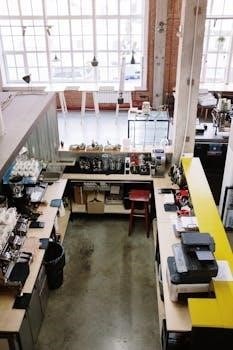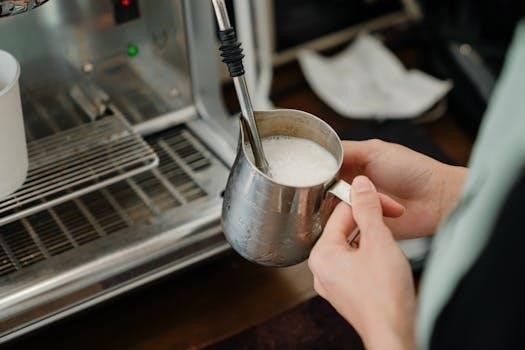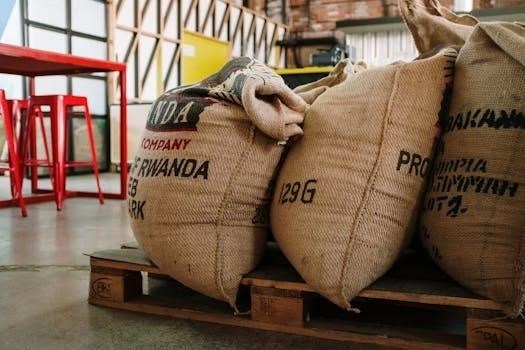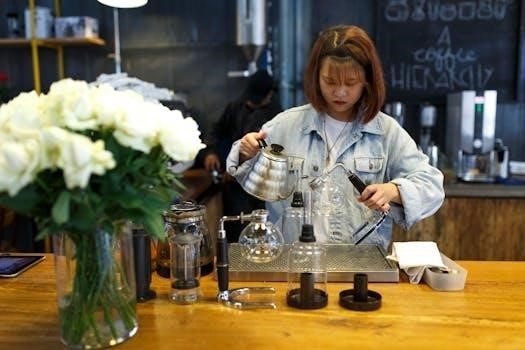Coffee Shop Equipment List⁚ A Comprehensive Guide
Starting a coffee shop is an exciting venture, but it requires careful planning, especially when it comes to equipment. A comprehensive equipment list, often available in PDF format, is crucial for ensuring your coffee shop runs smoothly. This guide will help you navigate the essentials.
Essential Equipment Overview
Opening a coffee shop requires a significant investment in equipment. This overview highlights the essential pieces you’ll need to start serving customers. The core of any coffee shop revolves around its ability to brew high-quality coffee, so an espresso machine and coffee grinder are indispensable. You’ll also need coffee brewers for drip coffee and blenders for specialty drinks.
Refrigeration is crucial for storing milk, ingredients, and pastries. A reliable point-of-sale (POS) system will manage transactions and track sales. Don’t forget smallwares like steaming pitchers, tampers, and thermometers. Disposable supplies, such as cups and lids, are also necessary for serving beverages to-go. Keeping the shop clean requires a stock of cleaning supplies. Finally, furniture and fixtures will create an inviting ambiance for your customers.
Remember that having a coffee shop equipment list PDF to reference can help ensure you don’t miss anything, setting your coffee shop up for success.
Espresso Machines⁚ Selection and Models
The espresso machine is the heart of any coffee shop, making its selection a critical decision. Consider your budget, volume, and desired features when choosing a model. Options range from entry-level machines to high-end models favored by specialty coffee shops. La Marzocco Linea PB is renowned for reliability and consistency. Nuova Simonelli Appia LIFE is a great mid-range option. For those looking to invest, the Slayer Espresso V3 offers advanced control.
Factors to consider include the number of group heads, boiler size, and ease of use. Automatic machines streamline the brewing process, while manual machines offer greater control. Look for features like pre-infusion, temperature stability, and programmable settings. Ensure the machine is easy to clean and maintain. Reading coffee shop equipment list PDFs can offer detailed comparisons of different models and their specifications.
Proper maintenance and cleaning are essential for prolonging the life of your espresso machine. Invest in a quality machine cleaner and follow a regular cleaning schedule.
Coffee Grinders⁚ Types and Importance
A high-quality coffee grinder is just as crucial as the espresso machine for producing excellent coffee. The grinder determines the consistency and particle size of the coffee grounds, directly impacting the flavor and extraction. There are two main types of grinders⁚ burr grinders and blade grinders. Burr grinders, which use two revolving abrasive surfaces, provide a more consistent grind and are preferred for commercial use. Blade grinders, on the other hand, chop the coffee beans with a blade, resulting in an uneven grind.
Conical burr grinders are known for their low noise and heat production, while flat burr grinders offer a more consistent particle size. Look for a grinder with adjustable grind settings to accommodate different brewing methods. The size of the hopper and the grinding speed are also important considerations. A larger hopper reduces the frequency of refills, while a faster grinding speed can improve efficiency during peak hours.
Regular cleaning is vital for maintaining grinder performance. Coffee oils can build up and affect the flavor of the coffee. Use a grinder cleaner specifically designed for coffee grinders.
Coffee Brewers⁚ Options for Different Brews
Beyond espresso, offering a variety of brewed coffee options is essential for catering to different customer preferences. Several types of coffee brewers are available, each with its own advantages. Drip coffee makers are a standard choice for brewing large batches of coffee quickly and consistently. These machines are easy to use and maintain, making them ideal for high-volume environments. Pour-over systems, on the other hand, offer more control over the brewing process, allowing baristas to fine-tune parameters such as water temperature and flow rate.
French presses are another popular option, known for producing a rich, full-bodied coffee. However, they require more manual effort and are better suited for smaller batches. Cold brew systems are gaining popularity, offering a smooth, low-acid coffee concentrate that can be served over ice or used in specialty drinks. Airpots and thermal carafes are essential for keeping brewed coffee hot for extended periods. Choose brewers with programmable features and automatic shut-off for safety and efficiency.
Regularly clean brewers to prevent mineral buildup and maintain the quality of the coffee. Descaling solutions are available to remove mineral deposits and ensure optimal performance.
Blenders⁚ For Specialty Drinks
Blenders are indispensable for creating a variety of specialty drinks, from iced coffees and smoothies to blended frappes and milkshakes. A high-quality commercial blender is essential for handling the demands of a busy coffee shop. Look for blenders with powerful motors, durable blades, and multiple speed settings to achieve the desired consistency for different drinks. Some blenders also come with pre-programmed cycles for specific recipes, simplifying the blending process.
Consider the capacity of the blender jar, as well as its material. Polycarbonate jars are durable and shatter-resistant, making them ideal for high-volume use. Noise reduction features are also important, as blenders can be quite loud. Investing in a sound enclosure can help minimize noise and create a more pleasant environment for customers.
Clean blenders thoroughly after each use to prevent cross-contamination and maintain hygiene. Disassemble the blender and wash all parts with soap and water; Sanitize the blender jar and blades regularly to eliminate bacteria. Having multiple blender jars can speed up the drink preparation process during peak hours. Blenders are crucial for a diverse menu.
Refrigeration Equipment⁚ Storage Solutions
Refrigeration equipment is vital for storing ingredients and prepared items, ensuring freshness and food safety. Essential refrigeration units include reach-in refrigerators for storing milk, syrups, and other beverages, as well as walk-in coolers for larger quantities of ingredients. Display refrigerators are perfect for showcasing pastries, sandwiches, and other grab-and-go items to entice customers;
Consider the size and capacity of your refrigeration units based on the volume of ingredients you need to store. Look for models with adjustable shelves and temperature controls to accommodate different types of products. Ensure that your refrigeration equipment meets food safety standards and is easy to clean and maintain. Regularly check the temperature of your refrigerators to ensure that they are operating within the safe range.

Ice machines are also a crucial component of refrigeration equipment, providing a constant supply of ice for iced beverages. Choose an ice machine that can produce enough ice to meet your daily demand. Proper storage of dairy products, such as milk and cream, is essential to prevent spoilage. Industrial shelving is also necessary for organizing food and supply storage. Effective refrigeration is non-negotiable.

Point of Sale (POS) Systems⁚ Managing Transactions
A Point of Sale (POS) system is indispensable for managing transactions, tracking sales, and streamlining operations in your coffee shop. A robust POS system can handle various payment methods, including cash, credit cards, and mobile payments, ensuring a seamless customer experience. It also helps in managing inventory, tracking customer orders, and generating sales reports.
Consider features such as order customization, loyalty programs, and integration with accounting software when selecting a POS system. A good POS system should be user-friendly for both staff and customers, with an intuitive interface and efficient transaction processing. Ensure that the system can handle peak hours and large volumes of transactions without slowing down. Some POS systems also offer features like online ordering and delivery management, which can expand your business reach.
Investing in a reliable POS system not only simplifies transactions but also provides valuable data insights to help you make informed business decisions. You will be able to track popular menu items, identify peak sales times, and manage your inventory effectively. The right POS system is essential for a modern coffee shop.
Smallwares⁚ Essential Tools and Utensils
Smallwares are the unsung heroes of any coffee shop, encompassing all the essential tools and utensils needed for daily operations. These items might seem minor individually, but collectively, they play a crucial role in ensuring efficiency and quality. A well-stocked supply of smallwares keeps your baristas productive and your service smooth.
Essential smallwares include items like steaming pitchers for frothing milk, shot glasses for measuring espresso, and bar spoons for mixing drinks. Don’t forget about thermometers for monitoring milk and coffee temperatures, as well as timers to ensure consistent brewing times. Tampers are vital for packing espresso grounds evenly, while knock boxes provide a convenient way to dispose of used coffee pucks. Measuring cups and spoons are necessary for accurate ingredient portions, and whisks are perfect for blending ingredients.
Mugs, cups, saucers, and demitasses are indispensable for serving customers, and long-handled spoons are ideal for stirring beverages. Having a sufficient supply of these items prevents delays and ensures that your coffee shop can handle high customer volume. Investing in quality smallwares is an investment in the overall efficiency and success of your coffee shop.
Disposable Supplies⁚ Cups, Lids, and More
Disposable supplies are essential for any coffee shop serving beverages to-go. These items, including cups, lids, straws, and napkins, are crucial for providing customers with a convenient and hygienic way to enjoy their drinks on the move. Proper planning and stocking of disposable supplies ensure smooth service and customer satisfaction.
Coffee cups, available in various sizes, are the foundation of your to-go service. Select cups that are durable and well-insulated to keep drinks hot while protecting customers’ hands. Lids are equally important, preventing spills and maintaining beverage temperature. Ensure you have the correct lids for each cup size. Straws, both plastic and paper, are necessary for iced beverages.
Napkins are another essential disposable item, providing customers with a way to clean up spills and messes. Consider providing both regular and larger napkins for different needs. Don’t overlook other disposable items like cutlery for any food items you offer, and paper bags for carrying multiple items. Efficient management of disposable supplies minimizes waste and maximizes customer convenience.

Cleaning Supplies⁚ Maintaining Hygiene
Maintaining a clean and sanitary environment is paramount for any coffee shop. Adequate cleaning supplies are crucial for ensuring customer safety, preventing the spread of germs, and upholding a positive reputation. A comprehensive cleaning supply list should cover all areas of the shop, from the front-of-house customer areas to the back-of-house preparation and dishwashing stations.
Essential cleaning supplies include sanitizers, disinfectants, and all-purpose cleaners for wiping down surfaces, tables, and equipment. Dish soap and detergents are necessary for washing dishes, utensils, and glassware. Specific cleaning solutions are needed for coffee equipment, such as espresso machines and grinders, to remove coffee oils and residue. Floor cleaners and mops are vital for maintaining clean floors and preventing slips and falls.
Don’t forget about smaller items like cleaning cloths, sponges, and brushes for detailed cleaning. Hand soap and paper towels should be readily available in restrooms and employee areas. Proper storage and organization of cleaning supplies are essential for easy access and preventing contamination. Regular cleaning schedules and training for staff on proper cleaning procedures are vital for maintaining a hygienic environment.
Furniture and Fixtures⁚ Creating the Ambiance

The furniture and fixtures in your coffee shop play a crucial role in creating the desired ambiance and customer experience. Careful selection of these elements can transform a simple space into a welcoming and comfortable environment that encourages customers to linger and return. Consider the overall style and target audience when choosing furniture and fixtures.
Essential furniture includes tables and chairs in various sizes and styles to accommodate different group sizes and preferences. Comfortable seating options, such as armchairs and sofas, can create a cozy and relaxed atmosphere. A well-designed service counter is essential for efficient order taking and customer interaction. Display cases are needed to showcase pastries, sandwiches, and other food items.
Lighting fixtures play a significant role in setting the mood. Consider a combination of ambient, task, and accent lighting to create a warm and inviting atmosphere. Wall décor, artwork, and plants can add personality and visual interest to the space. Don’t forget about functional fixtures like shelving for storage and menu boards for displaying offerings. The layout and arrangement of furniture and fixtures should optimize traffic flow and create a comfortable and inviting space for customers.
Optional Equipment⁚ Roasters and More
While certain equipment is essential for any coffee shop, some items are considered optional, depending on the business’s specific goals and offerings. Investing in a coffee roaster can provide greater control over bean quality and flavor profiles. Roasting your own beans allows for unique blends and freshness, potentially attracting coffee enthusiasts.
Other optional equipment includes canning equipment for preserving seasonal ingredients or creating unique products. A tea brewer can expand beverage options beyond coffee, catering to a wider customer base. Specialized equipment like panini presses or waffle makers can diversify the food menu, offering more substantial meal options.
Display refrigerators for showcasing grab-and-go items or desserts can boost impulse purchases. Consider the initial investment, space requirements, and potential return on investment before acquiring optional equipment. Evaluate whether these additions align with your brand identity and target market. Carefully assess the benefits of each piece of optional equipment to make informed decisions that enhance your coffee shop’s offerings and profitability. Remember to factor in training and maintenance costs.
Checklists for Opening and Closing
To ensure smooth daily operations, checklists for opening and closing are indispensable. An opening checklist guarantees that all necessary tasks are completed before the first customer arrives. This includes turning on equipment like espresso machines and coffee brewers, preparing ingredients, and setting up the POS system. Filling sanitizer buckets, brewing morning coffee, and prepping the espresso machine area are crucial steps.
A closing checklist ensures that all tasks are completed before the end of the day, maintaining cleanliness and safety. Shutting down equipment, cleaning blenders and espresso machines, and washing dishes are essential. Sanitizing surfaces, restocking supplies, and securing the premises are also vital. These checklists help maintain hygiene standards, prolong equipment life, and provide a consistent experience. They streamline operations, prevent oversights, and ensure that the coffee shop is ready for the next business day.
Regularly reviewing and updating these checklists ensures they remain relevant and effective. Customizable checklist templates are often available in PDF format, allowing for easy adaptation to specific needs and operational procedures.

